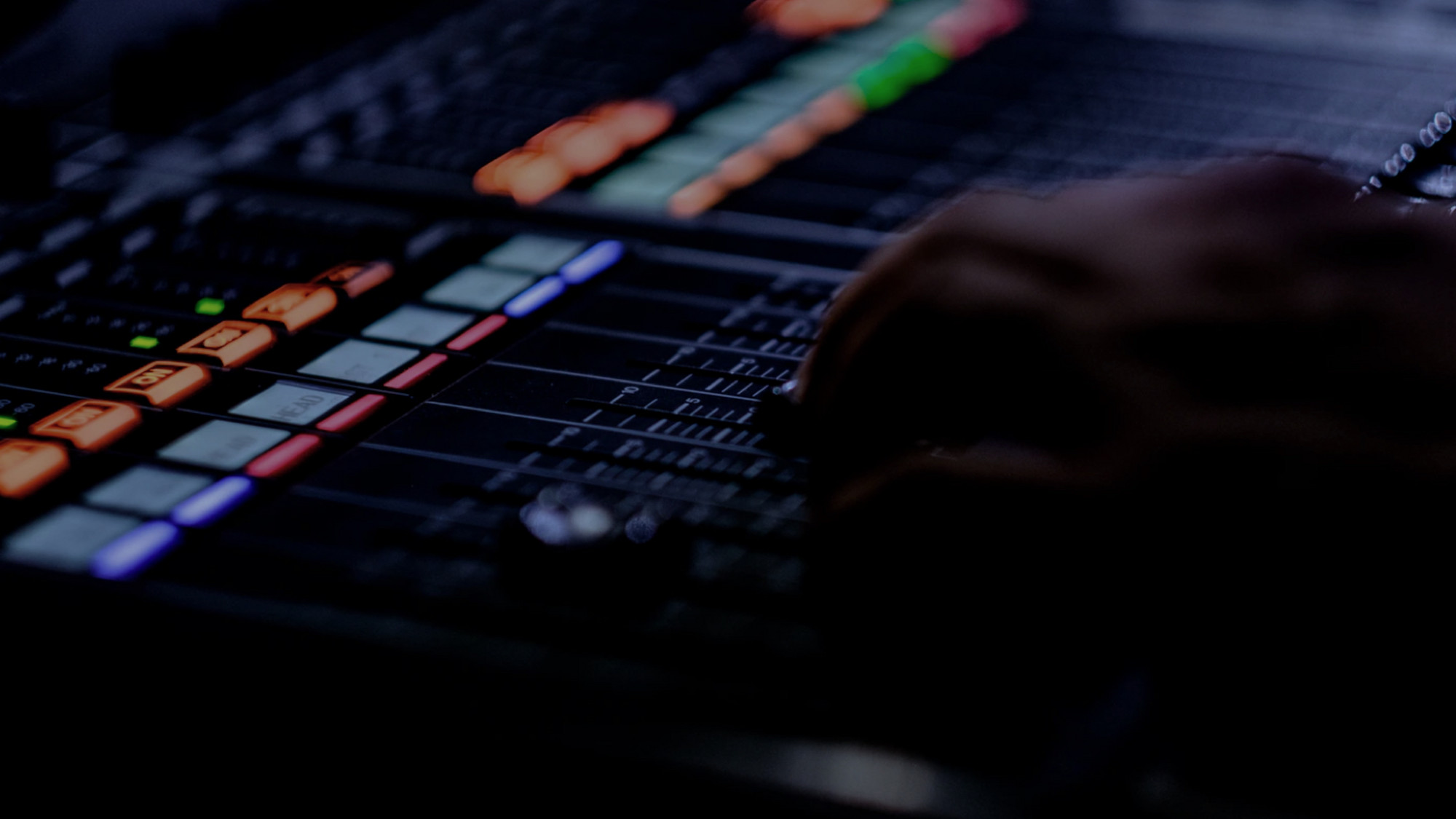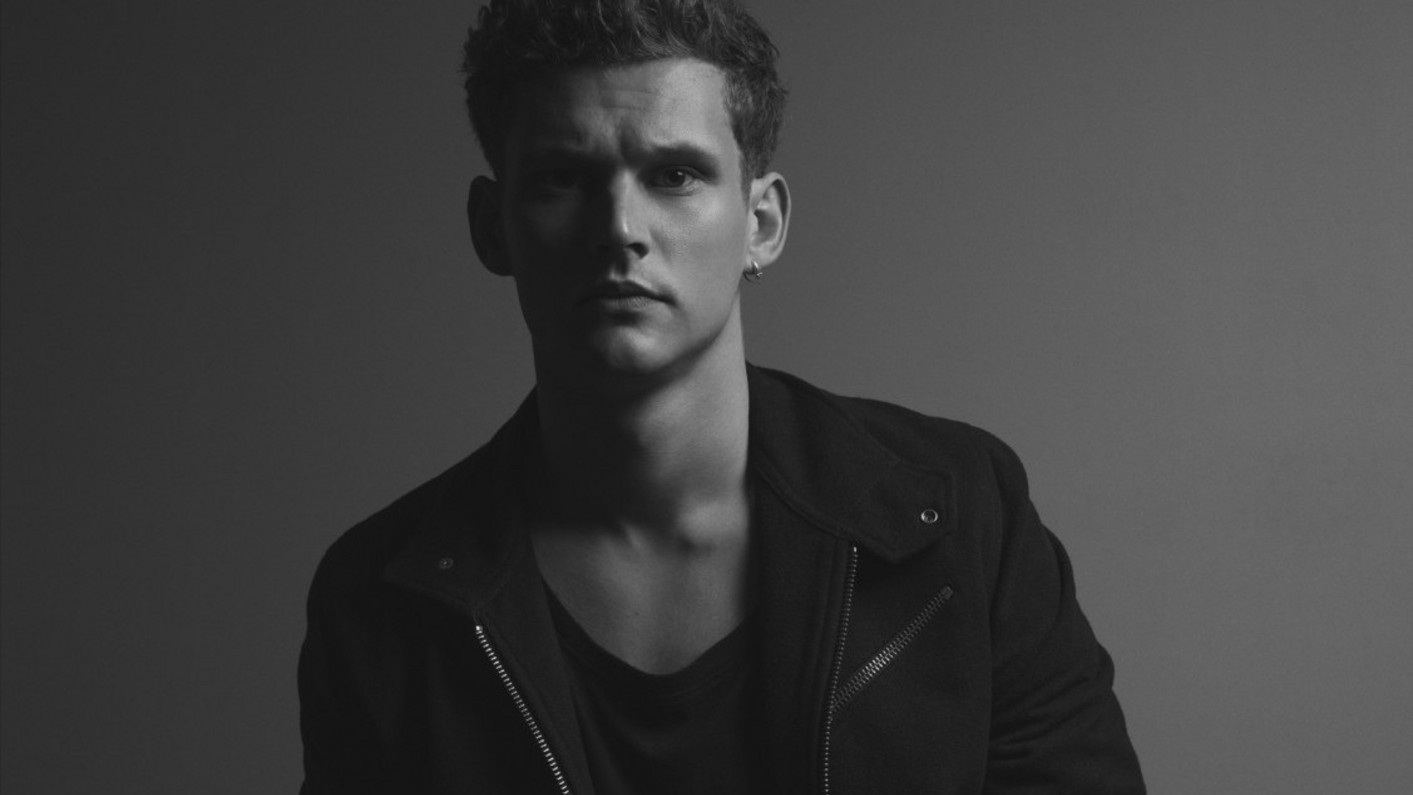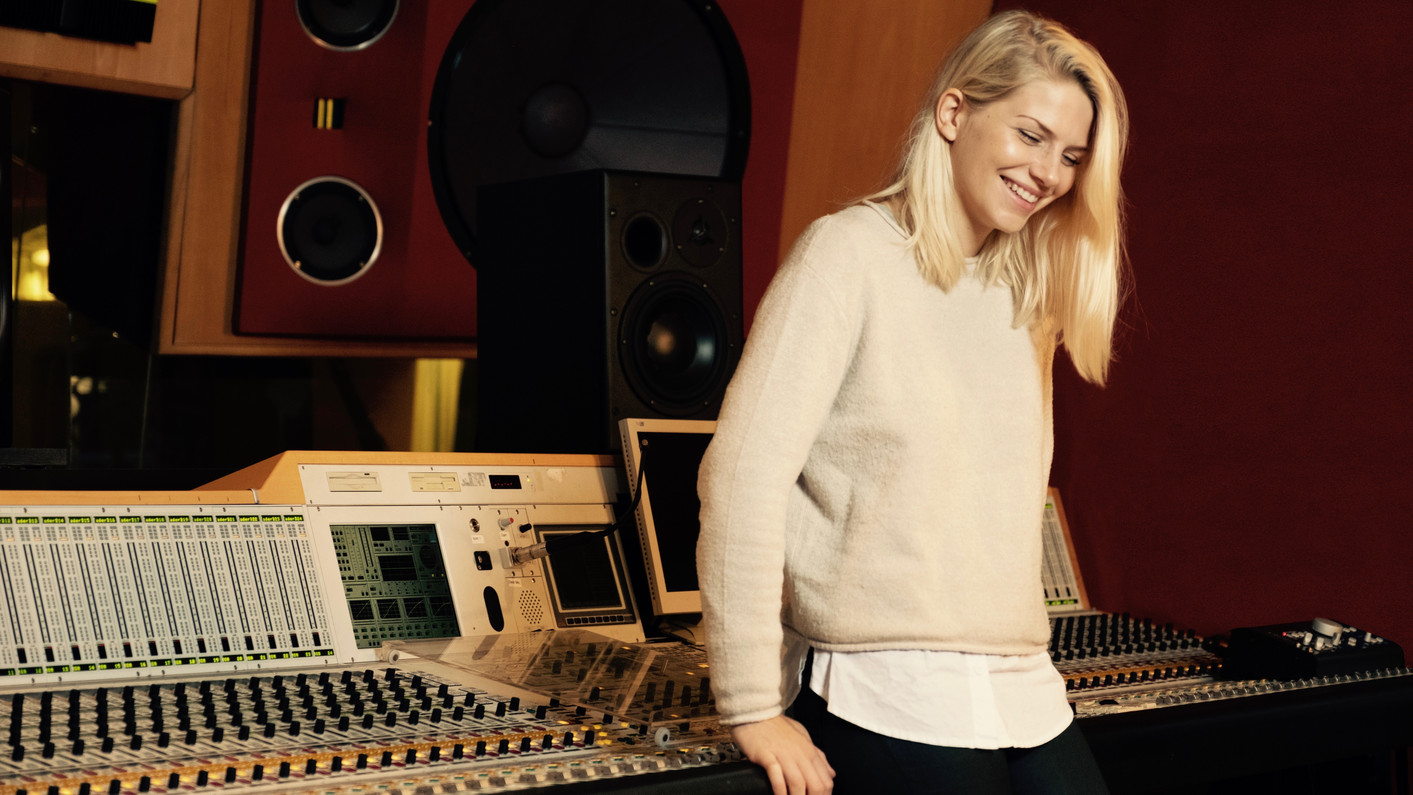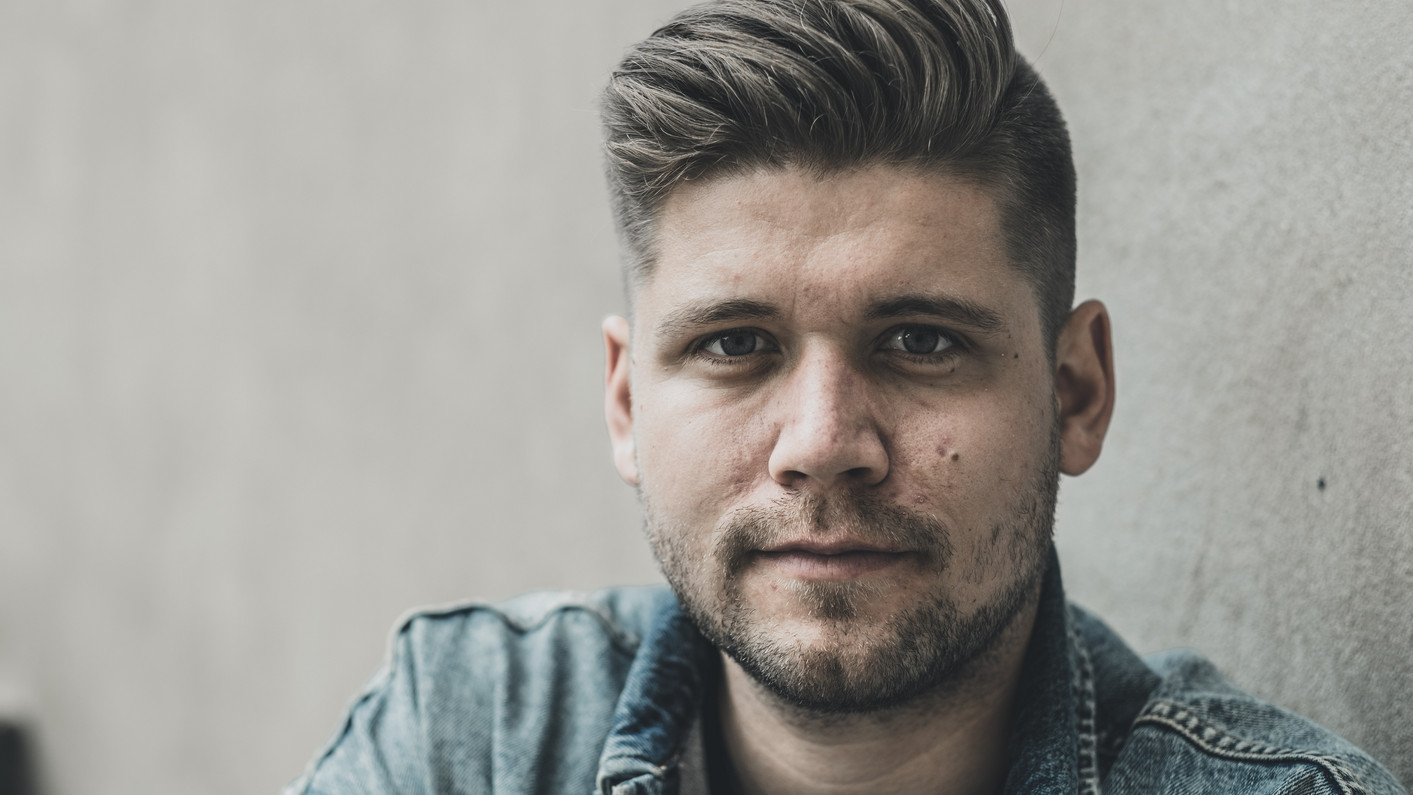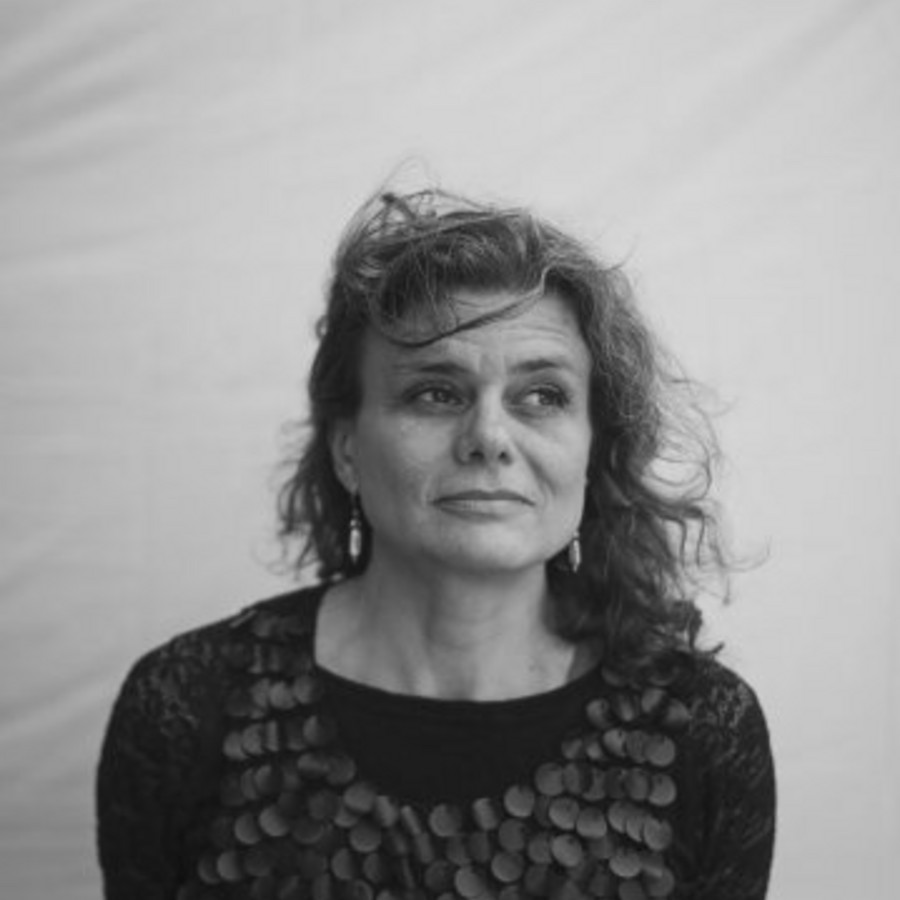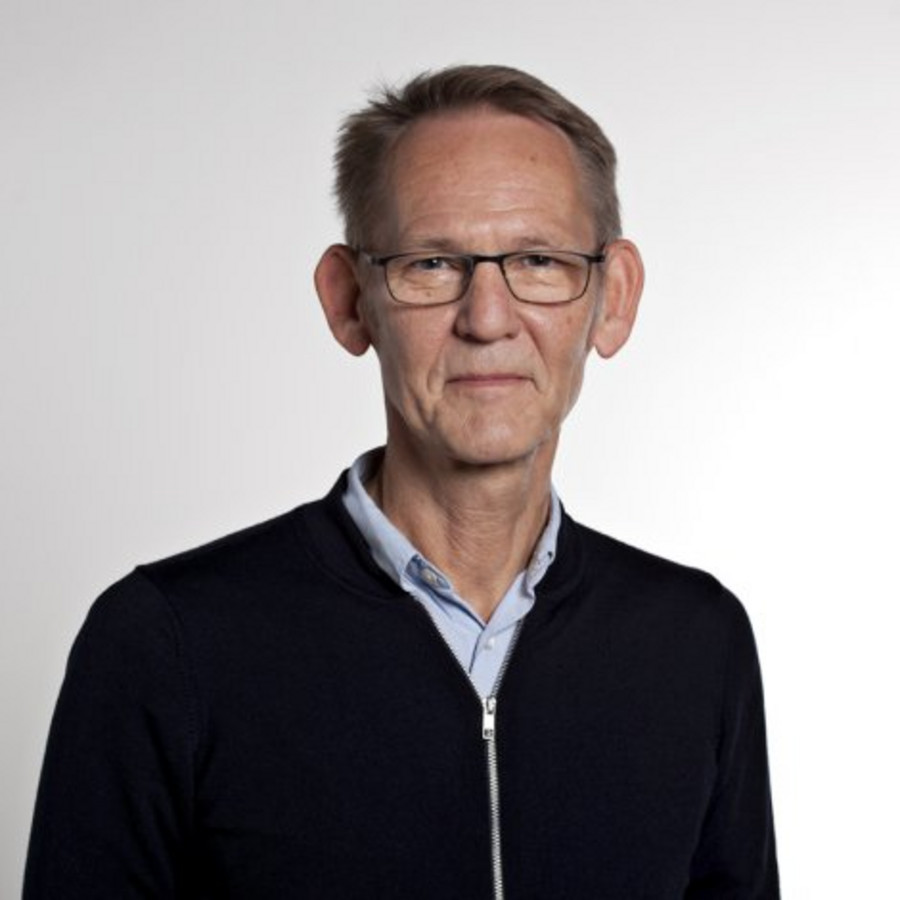The programme takes its starting-point in your vision, and aims to further develop your artistic and arts educational practice within rhythmic contemporary music.
On this study programme you become part of a diverse and inspiring study environment, where teachers, supervisors and fellow students stimulate and challenge your development.
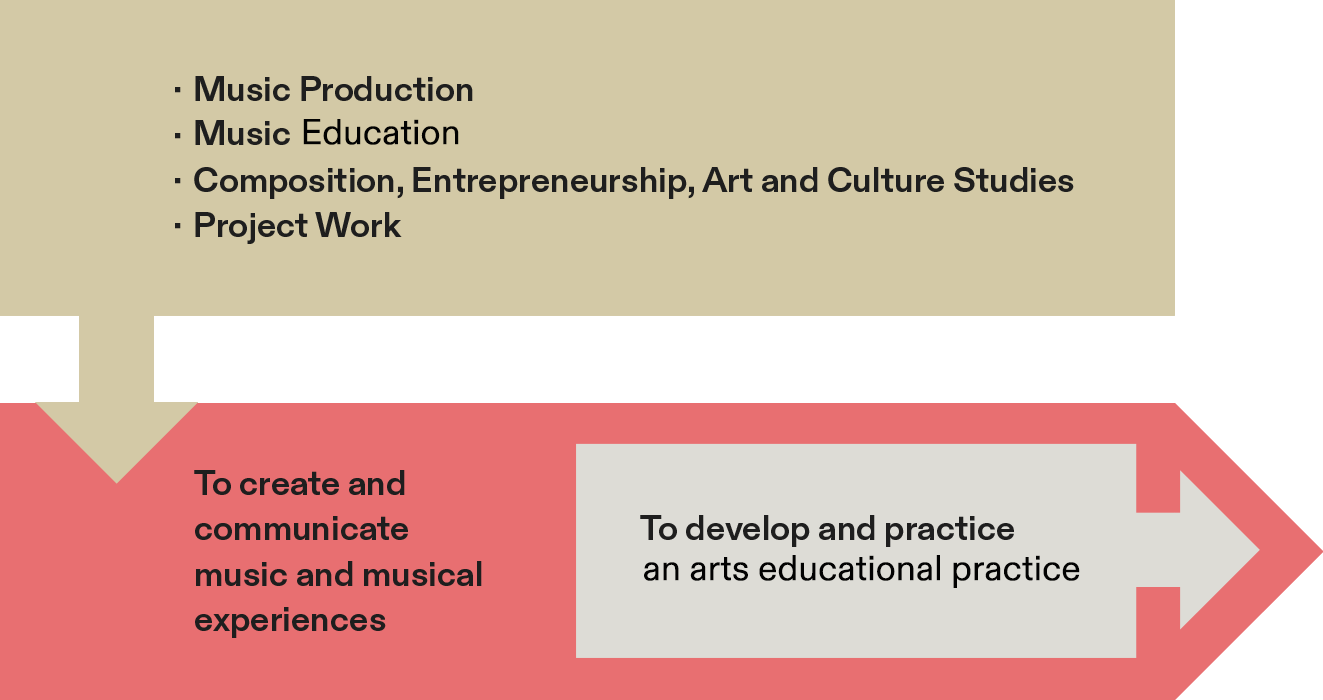
Via the conservatory’s extensive cooperation with external partners in Denmark and abroad, you obtain access to an extensive professional network that will strengthen your future employment opportunities in a changing music industry.
How do I apply?
You can read about this and much more under APPLICATION and ENTRANCE EXAMINATION below.
See as well the general information about application and admission:
| The study programme opens for applications | 15 October 2024 |
| Online information meeting | 4 November 2024 - at 16:00 Danish, at 17:00 English |
| Deadline for online application | 2 December 2024 at 12:00 CET |
| 1st round - You are not present | 2-10 January 2025 |
| Outcome of the 1st round by email | 16 January 2025 |
| 2nd round - You attend at RMC | 27-28 January 2025 |
| Outcome of 2nd round by email | 14 February 2025 |
| Online meeting for applicants offered a study place | 19 February 2025 at 16:00 |
| Start of study | 18 August 2025 |
Application and Entrance examination: Music Production
WHO CAN APPLY?
In addition to musical, sound engineering and collaborative skills at a high level, you must have worked on so many productions and gained so much experience and insight that the examiners can clearly sense an independent artistic expression at the entrance examination.
You must be able to take responsibility for your own learning process, and be able to work independently, both on your own and in collaboration with others. You should in general be open to experimentation and to expand your practice, so as to discover new aspects of yourself as an artist and music professional. All genres and styles are welcome.
You must have good communication and collaboration skills, as music producers as a natural part of their job must be able to collaborate with many different people – also in intensive artistic collaboration situations.
There is no requirement for a specific educational background.
The entrance examination at RMC is not coordinated with programmes at other academies of music. You are welcome to apply to several academies.
You can apply for several programmes at RMC simultaneously, but the entry examinations are not coordinated.
WHERE TO APPLY
You must apply online through:
You must create a profile, fill in the online application form and upload relevant files.
WHAT SHOULD THE APPLICATION CONTAIN?
In the application form you must upload music files, describe the uploaded music and answer a number of questions about your motivation for wanting to study at RMC, provide reflections on your artistic practice within music production, and describe your background and experience.
Music
- Upload 3 tracks that you have produced, and which you feel provide a good picture of who you are in the field of music production.
Total duration: 7-10 minutes
File format: mp3 - It is important that in all three tracks, you have made a significant artistic contribution to the sonic and production character of the works.
- At least one of the uploaded tracks must be a production in which you have produced the music for someone else (e.g. a soloist, artist, vocalist, musician, group or band).
- There are no limitations in relation to genre. All forms of artistic, musical expression are therefore welcome, as long as the uploaded music tracks live up to the above mentioned criteria.
Supplementary information
- Precise specification of your own role and the roles of any others in connection with each of the uploaded tracks.
Precise specification of who has written the music.
Max. 250 keystrokes for each track.
- A brief description of how you have produced the submitted tracks.
If the tracks are extracts from longer pieces, state this.
Max. 400 keystrokes for each track.
Written Application
- What are your artistic visions – what do you wish to achieve with/through your artistic practice?
Max. 1,000 keystrokes.
- What are your working methods – how do you work when creating and producing music, alone and when you work with others?
Max. 1,500 keystrokes.
- What sources of inspiration have informed your music – for example other producers, musicians, music creators, other art forms and/or societal issues?
How is this incorporated into your practice as a music producer?
Max. 1,000 keystrokes.
- Describe your background and experience in music production, including current projects and any experience as a music teacher.
Max. 1,000 keystrokes.
- Describe any other music-related experience or experience as a collaborative partner in other contexts.
Briefly describe your role.
Max. 500 keystrokes.
- State any previous related studies of higher education (conservatory, university, teacher training college, university college, etc.) and other education.
Max. 500 keystrokes.
- What is your motivation for studying at RMC - what do you wish to learn?
Max. 1,000 keystrokes.
APPLICATION FEE
Applicants for a bachelor programme at RMC must pay an application fee of 500 DKK. The fee covers part of the conservatory's costs in connection with processing applications as well as planning and running the entrance exams, and cannot be refunded after the application deadline has expired.
DEADLINE
The deadline for applications is 1 December at 12:00 CET. If this date is a Saturday, Sunday or a public holiday, the deadline will be at 12:00 CET on the next weekday.
WHO IS SELECTED FOR THE ENTRANCE EXAMINATION?
All who apply for admission to the Bachelor programme Music Production will have their applications assessed at the first round of the entrance examination.
WHAT IS THE PURPOSE OF THE ENTRANCE EXAMINATION?
The purpose of the entrance examination is to:
- To give the assessors an opportunity to thoroughly evaluate your creative qualifications and development potential within music production.
- To give you an opportunity to demonstrate your professional and artistic profile to the widest possible extent.
- To ensure that your background and experience, your reflections on your artistic practice as a music producer and your motivation to study at RMC are communicated.
FORM AND CONTENT OF THE ENTRANCE EXAMINATION
The entrance examination takes place in two rounds.
The 1st round consists of an assessment of the submitted tracks and the supplementary information.
The 2nd round consists of a work presentation and an interview, which take place at RMC.
1ST ROUND - ASSESSMENT OF SUBMITTED MATERIAL
The first round consists of an assessment of the submitted tracks and the supplementary information (credit list, brief description of the submitted music examples).
You will not be present at the assessment.
An assessment panel consisting of two assessors will make an overall assessment on the basis of the submitted tracks and the supplementary information.
In the assessment, emphasis is placed on:
- Your ability to create music and musical experiences borne by an independent artistic expression.
- The extent to which you possess the specific music production skills necessary to realise the music and your artistic expression as a music producer.
- The extent to which you possess the other relevant professional skills that are necessary to realise the music and your artistic expression as a music producer.
You will be awarded points on a 100-point scale, which is a subdivision of the 7-point scale. A minimum of 40 points is required to pass the examination.
The assessment is given in relation to the level required to commence the study programme.
SELECTION AFTER THE 1ST ROUND
Based on the assessments, RMC selects a number of applicants to advance to the second round. This group is usually three times larger than the number of applicants who can be admitted to the programme. The selection process also takes into account the requirements of the music business.
The applicant must pass the first round in order to advance to the second round.
All applicants will receive a response to the first round via e-mail. For applicants, who are selected to advance to the second round of the entrance examination, the e-mail will contain information about the requirements for the additional material* which must be uploaded, link to the material for the bound assignment and the precise time of the entrance examination.
No feedback is offered to applicants who do not advance to the second round.
2ND ROUND – PRESENTATION & INTERVIEW
The 2nd round of the entrance examination consists of a work presentation* and an interview between you and three internal examiners.
The entrance examination takes place at RMC and you must be present.
The interview is based on your written application and the presentation.
Work presentation: 10 minutes.
Interview: 10 minutes.
You are not allowed to bring other persons to the entrance examination.
Work Presentation
You must present three fully produced works meeting the following requirements:
- Work no. 1 & 2 must be own productions, where at least one of them is a work, where you have produced the music for someone else (e.g. a soloist, artist, vocalist, musician, group or band).
- The material must not be identical to the material, uploaded with your application before 1 December.
- Duration: 6-7 minutes.
- Format: mp3.
- Work no. 3 must be a new production by you, based on the audio files you received from RMC in connection with the invitation to the second round.
- Duration: 2-3 minutes.
- Format: mp3.
- It is important that you have made a significant artistic contribution to the sonic and production character of all three works.
- You must bring all three works on a USB stick, so that they can be played from the leading examiner's computer.
At the second round, an overall assessment is made of:
- Your ability to create and communicate music and musical experiences borne by an independent artistic expression.
- The extent to which you possess the music production skills necessary to realise the music and your artistic expression as a music producer.
- Whether you possess the other relevant professional skills that are necessary to realise the music and your artistic expression as a music producer.
- Your ability to reflect on your artistic practice as a music producer.
Emphasis is also placed on your experience of developing and realising artistic projects, independently or with others.
You will be assessed according to a 100 point scale, which is a subdivision of the Danish 7 step grading scale. A minimum of 40 points is required to pass the audition.
The assessment is given, related to the level that is required to commence the programme.
ENTRANCE EXAMINATION LANGUAGE
The entrance examination is normally conducted in Danish. Foreign applicants may however take the entrance examination in English.
ADMISSION
On the basis of the result of the second round, the best-qualified applicants will be admitted to the programme. If several applicants are equally well-qualified, factors such as the requirements of the music business may be included in the Conservatory’s decision on who to admit.
Eight students are usually admitted to the programme. Due to the limited number of places available, the Conservatory may be obliged to reject some applicants even if they have passed the entrance examination.
You will receive an e-mail informing you of whether or not you have been admitted.
All applicants who are not admitted will be offered a brief, ten-minute telephone conversation with the responsible internal examiner, who will elaborate on the assessment result on the basis of the assessment criteria used.
WAITING LIST
A limited number of applicants who are qualified for admission, but who have not been admitted due to a lack of places available, may be offered a place on a waiting list. In the period up to 1 June, applicants on the waiting list may be offered admission.
ILLNESS IN CONNECTION WITH THE ENTRANCE EXAMINATION
Illness must be documented by medical certificate if you wish to have the opportunity to take a make-up examination. The medical certificate must be provided no later than three workdays after the examination date. The Conservatory will determine the date of any make-up examination, and you will be notified of this as soon as possible. It will not be possible to take the make-up examination at any other time than that set by RMC. You are responsible for paying the cost of the medical certificate.
Programme structure: Music Production
The study programme is aimed at you who would like to have a sustainable working life as a music producer. As a professional in rhythmic music, you must largely create your own employment. Therefore, the course has a broad scope and prepares you for a career which consists both of your own artistic and arts educational projects and projects where you engage in other potentials and purposes in partnership with others.
It is the goal of the study programme that you, after graduation, have developed a strong and wide-ranging artistic and arts educational practice, where good craftsmanship skills and the ability to collaborate and reflect on methods, contexts and results are decisive elements. The course will thus enable you to continuously reinvent yourself throughout a long life as a music producer, music teacher and entrepreneur.
You will have gained insight into a wide range of functions in music life and have formed a strong network, which you will benefit from in the rest of your professional work.
In the study programme, emphasis is placed on ensuring that your own ideas and your own practice get the best conditions for development in a study environment that supports experimentation, investigation and the open work process. At the same time, there is a focus on you building up knowledge and skills at a high level, within the field in which you work.
The teaching includes music production, music technology, artistic development, composition and pedagogy.
The teaching alternates between timetabled, week-based teaching, project weeks, individual teaching and teaching in groups.
The teaching, on the one hand, seeks to meet the needs of the individual student and, on the other hand, places emphasis on establishing a common platform where students inspire and support each other in their artistic and professional development.
During the course, you will also take part in a number of self-organized productions with fellow students from the conservatory's other study programmes.
Some of the teaching is organized for you, some you organize yourself, and during the course you will enter into collaborations with students from both your own and the conservatory's other study programmes as well as with partners from the conservatory's outside world. The study programme includes a lot of independent work and preparation, and you will also have to read and write professional texts.
The teaching is mainly within your own year, however, subjects and projects can be in teams made up across years and/or study programmes.
The course concludes with a Bachelor project, where you will have the opportunity to immerse yourself in a self-selected topic within music production and present the result at a public graduation festival.
The course is a full-time study, and attendance at tuition is compulsory. The language of instruction is usually Danish, but teachers may provide teaching in English to individuals or small groups as necessary.
During the course of studies it is optional to apply for exchange studies at a foreign conservatory or for self-planned studies abroad.
A Bachelor in music production provides you with a foundation for further studies at Masters level at a Danish or a foreign conservatory.
With a Bachelor in music production you can apply for the Masters in Music Creation and Music Education at RMC.
The study programme corresponds to 180 ECTS points, equivalent to three years of full-time study at 1,620 working hours per year. A year of full-time study includes all work connected with the study programme, including classes, independent study, examinations and all other study-related activities.
The table below shows how the subjects and ECTS points are distributed in the programme.
You can read more about the objectives and structure of the programme in the programme curriculum, where you will also find detailed descriptions of the individual subjects – click on the link to the right.
You can read more about the objectives and structure of the study programme in the curriculum, where you will also find detailed descriptions of the individual courses.
Below you will find the list of teaching staff on the programme in the current study year, permanent academic staff as well as contract teachers.
RMC prioritizes diversity in terms of genre and fields of expertise when the entire group of teachers is composed.
As a student, you are offered a wide spectrum of professional impulses from permanent teaching staff as well as from contract and external teachers.
Within the core subjects of the programme, the teaching performed by the permanent staff will normally not exceed more than two thirds of the total number of teaching hours.
In relation to special courses, projects and similar activities, you will have the opportunity to meet a large number of external teachers.
Musikproduktion / Music Production
Mads Kinnerup Jørgensen
Morten Büchert
Musikproduktion (individuel, faglig vejledning) / Music Production (Individual Subject-specific Tuition)
Anja Tietze Lahrmann
Birk Nevel
Daniel Engholt Carlsen
Lykke Meyer Vejborg Jakobsen
Nana Fagerberg
Sophie Ziedoy
William Asingh
Tor Bach Kristensen
Nis Bysted
Troels Boberg
Mads Kinnerup Jørgensen
Morten Büchert
Tor Bach Kristensen
Carsten Heller
Greta Schenk
Jacob Brøndlund
James Rand
Peter Biker
Kirina Stensby
Felix Havstad Ziska
Musikteknologi / Music Technology
Morten Büchert
Eddy Bøgh Brixen
Anders Stadelund
Mads Kinnerup Jørgensen
Bachelorprojekt / Bachelor Project
Morten Büchert
Musikpædagogik og læring / Music Education and Learning
Malene Bichel
Jens Skou Olsen
Kim Boeskov
Maria Westvall
Clara Vuust
Morten Lundsby
Albert Raft Rasmussen
Aisha Thorsen
Komposition / Composition
Jaleh Negari
Soffie Viemose
Anders P. Jensen
Louise Dam Eckardt Jensen
Michael Møller
Jens Bjørnkjær
Simin Stine Ramenzanali
Simon van Deurs Formann
Morten Winther Nielsen
Kunst- og kulturstudier / Art and Culture Studies
Rune Søchting
Mimmi Bie
Henrik Marstal
Anders P. Jensen
Cathrine Landberg
Jens Tang Kristensen
Mathias Schønberg
Entreprenørskab / Entrepreneurship
Christian Taagehøj
Subjects and ECTS
Subject
- 1. Sem.
- 2. Sem.
- 3. Sem.
- 4. Sem.
- 5. Sem.
- 6. Sem.
- Subject ECTS
Music Production
50 ECTS
Subject
- 1. Sem.
- 2. Sem.
- 3. Sem.
- 4. Sem.
- 5. Sem.
- 6. Sem.
- Subject ECTS
Music Production
- 12.5
- 12.5
- 12.5
- 12.5
- 50
Music Technology
10 ECTS
Subject
- 1. Sem.
- 2. Sem.
- 3. Sem.
- 4. Sem.
- 5. Sem.
- 6. Sem.
- Subject ECTS
Music Technology
- 2.5
- 2.5
- 2.5
- 2.5
- 10
Music Education
30 ECTS
Subject
- 1. Sem.
- 2. Sem.
- 3. Sem.
- 4. Sem.
- 5. Sem.
- 6. Sem.
- Subject ECTS
Music Education
- 7.5
- 7.5
- 7.5
- 7.5
- 30
Composition
20 ECTS
Subject
- 1. Sem.
- 2. Sem.
- 3. Sem.
- 4. Sem.
- 5. Sem.
- 6. Sem.
- Subject ECTS
Composition
- 5
- 5
- 5
- 5
- 20
Art and Culture Studies
10 ECTS
Subject
- 1. Sem.
- 2. Sem.
- 3. Sem.
- 4. Sem.
- 5. Sem.
- 6. Sem.
- Subject ECTS
Art and Culture Studies
- 2.5
- 2.5
- 2.5
- 2.5
- 10
External, Collaborative, Integrated Project
30 ECTS
Subject
- 1. Sem.
- 2. Sem.
- 3. Sem.
- 4. Sem.
- 5. Sem.
- 6. Sem.
- Subject ECTS
External, Collaborative, Integrated Project
- 30
- 30
Entrepreneurship
10 ECTS
Subject
- 1. Sem.
- 2. Sem.
- 3. Sem.
- 4. Sem.
- 5. Sem.
- 6. Sem.
- Subject ECTS
Entrepreneurship
- 10
- 10
Bachelor Project
20 ECTS
Subject
- 1. Sem.
- 2. Sem.
- 3. Sem.
- 4. Sem.
- 5. Sem.
- 6. Sem.
- Subject ECTS
Bachelor Project
- 20
- 20
